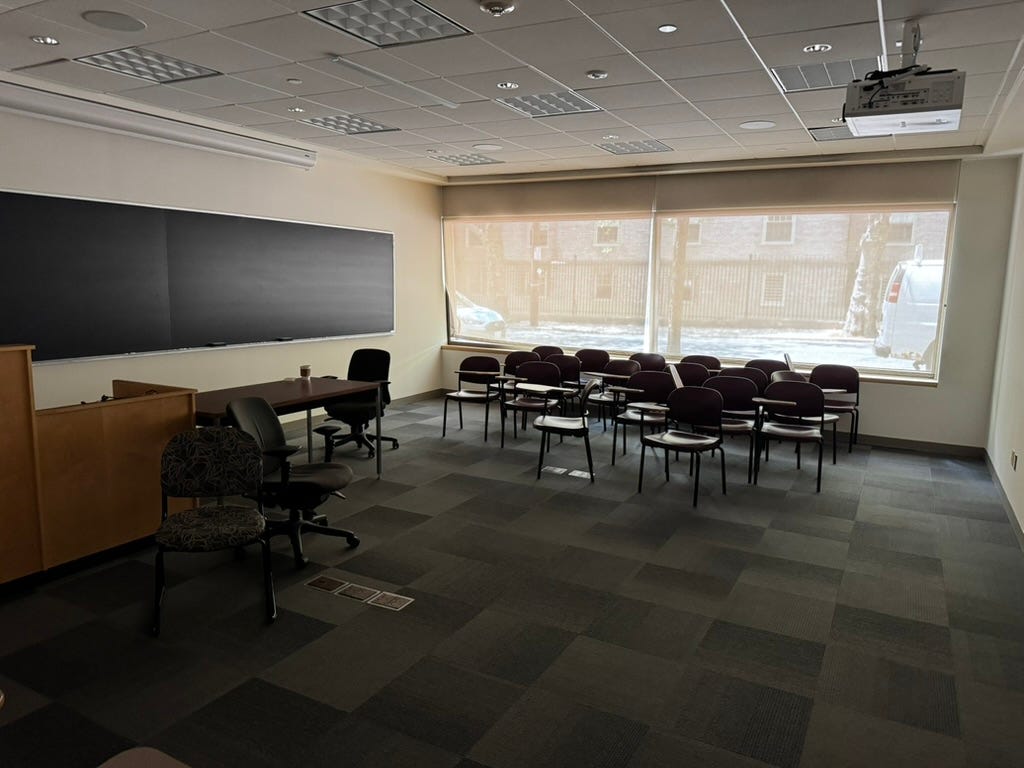Place Poem: "Scotch Tape Body" by Ron Padgett
Some professional navel gazing from my native New England
Long-time readers already know that I’m a nostalgic person by nature. I like cataloguing the past so I can check back in from time to time. As I’ve mentioned before, I save every poem I’ve ever read and liked. I have a soft spot for my Apple photo library’s tendency to serve me up old memories from 5, 10, or even 20 years ago. More than anything else, though, I’m a sucker for actually going and visiting places from my past, and taking them in. The longer it’s been since I’ve visited, the better.
Nostalgia does have its detractors, and they do have a point. For example, a reasonable read of the admissions I just made is that I have great difficulty being in the present moment, which the meditation apps advertising to me on Instagram are deadset on getting me to do for my own good. We all probably know folks who tend to “live in the past”, probably to avoid problems of the present or future; or who refuse to let relationships grow and flourish in exciting ways, in favor of the safety of old times.
There’s truth to all of this. But I’ve also noticed a tendency to port these concerns over to professional creativity. These are waters I swim in pretty frequently, especially here on Substack. The concern is that nostalgia, by keeping us beholden to old memories and ideas, stifles the creative voice and stirs up a kind of “imagination stagnation.”
I get the concern, but it’s never been my experience. If anything, I’ve found unexpected, generative energy in reviting my old work from time to time. I can mine it for nuggets of unused or incomplete ideas; I can learn from past mistakes (I’ve made many); or, if nothing else, I can just stand in appreciation of where I’ve been, after which I have a simple starting point for where to go next. As I teeter on the precipice of a semester-long sabbatical, during which time I’m supposed to be sketching out the next stage of my career, now seems like as good a time as any to do this.
In the scheme of things, of course, my career is (god willing) just getting started. I’ve only just gotten tenure, and the road ahead is long, probably winding, and paved with the best of intentions. At the same time, if we’re including grad school (and by god, we should), I’ve been doing at least semi-legitimate political science for 11 years now. That means there’s plenty of all of it — the good, the bad, the ugly, and the amusing — to look back on, and let arise whatever feelings might float to the surface.
Today’s poem recounts this process from the perspective of one of my favorite poets, Ron Padgett. “Scotch Tape Body” doesn’t dive into a place so much as a space: the pages of our past work, whatever it looks like. Padgett amusingly prods the ways in which we not only make peace with the work we’ve done; but also, how we might open ourselves up to loving the wonderous, possibly-foolish version of ourselves who created it.
“Scotch Tape Body”
by Ron Padgett
I never thought, forty years ago, taping my poems into a notebook, that one day the tape would turn yellow, grow brittle, and fall off and that I’d find myself on hands and knees groaning as I picked the pieces up off the floor one by one Of course no one thinks ahead like that If I had I would have used archival paste or better yet not have written those poems at all But then I wouldn’t have had the pleasure of reading them again, the pleasure of wincing and then forgiving myself, of catching glimpses of who I was and who I thought I was, the pleasure—is that the word?—of seeing that that kid really did exist.
Place-related nostalgia has been heavy in the air over the past week, while I’ve been paying a visit to my native New England. I’ve spent time with family and friends in places familiar and beloved from the first quarter of my life, mainly in Rhode Island, my tiny but might home state where was born, raised, and went to college. This was my central hub for the rougly 25-year period prior to the career that began in earnest when I started graduate school.
In the past, I’ve tended to think of these two periods as distinct from each other. In the summer of 2014, I flew the coop, leaving Rhode Island for Washington, DC, where grad school would set me on the tortuous but (on balance) rewarding path to academia. I was putting my homeplace in the rear view; leaving the close comfort of family and friendships that had supported me so far; and starting a journey with an unclear destination. Trips home to Rhode Island that happened after that were more sporadic, and happened pretty squarely outside of the context of what I was doing for a living. My personal roots were dug in pretty deeply in New Engalnd; but the political science was happening (at first, appropriately enough) in DC, and then (as it is now) in Boise.
But this past week has, to an uncanny extent, blown that neat compartmentalization to pieces. That’s because I was heading to my old stomping grounds not just to connect family and friends, but to present a paper at a polisci conference held in my home state. As I learned more about the conference leading up to it, the locational coincidence went from a fun piece of trivia to a heat-seeking nostalgia missile. Not only was I presenting at my alma mater — Brown University, in Providence — but my undergrad faculty advisor was the one organizing it. Even the presentation itself would be taking place just a few dozen steps down the hall from the classroom where I took my first polisci course, the instructor of which was that same faculty advisor.

I have little doubt that, after observing my middling performance in her class back in 2007, my advisor would have put any serious money on my ending up with essentially the same job she had: the one on the grading end of my truly questionable term paper about why Ben Franklin absolutely would have been against capital punshment. Certainly I would not have predicted this — I was, after all, an 18-year-old prospective English major with the sole destiny of becoming the Next Great American Novelist.
In other words, I’d not have believed anyone who told me that a decade and change later, I’d be a fully-fledged and reasonably successful political scientist. But as I presented my research last Thursday, no amount of imposter syndrome could hide the fact that I was one. The audience included legendary Congress scholars who began their careers decades before I did. It also included wonderfully eager grad students and junior faculty who asked me — me! — for career advice during breaks. I had not just come full circle, but found myself in the middle of another rotation around it.
The icing on this circular cake is that, as I’ve talked about here before, my research investigates whether or not members of Congress possess deep local roots in the districts they represent in government; in other words, whether they were born and raised there, went to school there, and began their careers there. In short, I’ve found a good bit of evidence that these place-based ties matter a ton to their voters, and significantly shape the kind of representation these members provide. In other words, I was presenting research that was eerily relevant to the professional nostalgia kick I was currently luxuriating in; and doing so was nothing short of an out-of-body experience.
Was it my personal tendency towards place nostalgia that naturally led me to these research questions about local ties? Or, has doing the research amped up my sentimentality about the place I grew up? As with all bewildering research questions, the causal arrow probably goes in both directions. What I know for sure, though, is that doing this work has showed me that the distinction between where we’ve been and where we are is far blurrier — and more interesting — than we might care to admit.
I’ve learned, too, that even though by definition our place roots don’t move, they can still grow and change. I find new things to love each time I go home to Rhode Island, not in spite of, but because of the deep ties I have there. I find new ways to love old places, too, because of what I’ve learned about the importance of place in my professional life. My research, and my vocation, blossomed only once I left the Ocean State; but its roots are right where I left them a decade ago.







I enjoyed reading this immensely. As I responded to your previous article, LIVING in a place gives one perspectives that they otherwise wouldn’t have. I had many misconceptions (and if I am honest, prejudices) about southerners prior to living in Memphis for nine years. Many preconceived notions were confirmed and others challenged. Living in Pittsburgh gave me even more than a fine husband a Steeler fanaticism. I actually have a theory about why Hillary lost Pennsylvania that others who have not been immersed within my favorite blue collar town don’t have. May we all continue not just to travel and see places but to talk to others and learn about their lives. It humanizes all the statistics and putting a human face on things these days is so very needed.
Given your connection to both states, and the fact that you specialize in Congress, it's funny to think that Idaho will likely gain a third House seat in 2031, possibly at Rhode Island's expense! I'll leave it to you to figure out the symbolism there. :)